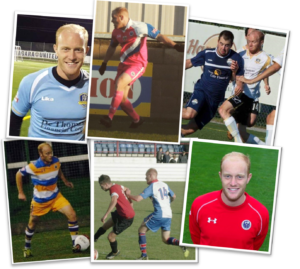NORTHBROOK, IL – JULY 2, 2018
Yulia Carson, IOR’s Director of Global Talent Development, sits down with Corey Novotný, a former soccer player about avoiding the ugly side of playing the beautiful game abroad
With the World Cup in full swing across Russia, we once again are witnessing not only the sportsmanship and technical mastery of soccer teams from across the globe, but also getting a glimpse into how these players navigate the cultural nuances of a host country. For instance, we saw a Portuguese team with Cristiano Ronaldo being very surprised when greeted upon their landing in the city of Sochi with bread and salt, an old Russian tradition reserved for guests of the highest honor to demonstrate Russia’s hospitality, friendship and trust.
country. For instance, we saw a Portuguese team with Cristiano Ronaldo being very surprised when greeted upon their landing in the city of Sochi with bread and salt, an old Russian tradition reserved for guests of the highest honor to demonstrate Russia’s hospitality, friendship and trust.
As we all know, most professional athletes travel extensively around the globe, and many will play for a number of international clubs during their career. Therefore, they know all the benefits and challenges of adjusting to a new country and new culture first hand.
IOR’s head of Marketing, Corey Novotný, has experienced these challenges and benefits a few times. Corey played professional soccer (he would say football) for three years and has lived in England, Spain and Canada.
I spoke with Corey about the nuances of living and playing internationally and provide a best practices list for athletes that are considering a move abroad:
 Living and playing abroad was an amazing experience. Though I’m definitely not by any means an expert, looking back I’ve learned a few things that have really helped me out:
Living and playing abroad was an amazing experience. Though I’m definitely not by any means an expert, looking back I’ve learned a few things that have really helped me out:
Do your homework and don’t assume you’ll have a flawless support network after you arrive
Researching your country beforehand and reaching out to those who can help you prepare for a new experience is important. Just like unpacking your belongings, it will take time before you are fully able to operate in a new setting. You have to “pack mentally” as well. If you pack the correct knowledge and prepare ahead of time, the less difficult unpacking will be.
Connect with people different from yourself
Organizations are run differently, and people work differently. Understanding how to connect with people that are different opens your own mind, allows you to become more flexible to new ideas, and more efficient in executing them. In my experience, those players that limited themselves to interacting only with their fellow countrymen over time felt isolated, some even broke their contracts and went home early.
Make an effort to learn the local language and the language that is used during practice
This will help you feel more integrated with the community and your teammates, even if they do speak English as a second or third language. Also, don’t assume that the main language during practice will be English. When I played in Toronto, due to a large number of South American players, Spanish became the main spoken language on field. Those that did not speak Spanish struggled.
Scratch below the surface when learning about the new culture
When playing in England and Canada I learned that despite it seemingly being a relatively short cultural distance from the States, the player culture was different. One very noticeable difference is the background of footballers from outside the US. In America, most serious soccer players come from suburban “pay-to-play” clubs and play in college. This doesn’t happen anywhere else: a lot of players sacrifice their education to play, and don’t have a diploma to fall back on. In a profession where any bad day could be your last, and you may have a family back in Brazil depending on you, it can be quite intense. You couldn’t take it personally that despite being very close with teammates, if the opportunity presented itself, he was going to try and take your spot, and vice-versa.
Create a checklist of small things to accomplish; local places you would like to see and local practices you would like to learn
Every week I created a new list of things I wanted to accomplish, experience and learn. Some things were as simple as figuring out how to buy groceries, others were as complicated as having to get a Tax ID. It allowed me to integrate quicker into my new community and was a real confidence booster.
Look at this as an opportunity to raise your self-awareness and grow as person
Most people that live abroad agree that they learn a lot about themselves. You are forced to develop an identity in a new setting, and you are no longer surrounded by the regular influences of your home country. This causes you to look inward at your own interests, skills and curiosities to connect with your new setting.
Though tough at times, living abroad was an extremely rewarding experience. Leaving the U.S. helped me to play the sport I love, but I also received so much more than that. Assimilating into new cultures opened up a world of new and exciting experiences, opportunities and learning.
So while you root for your favorite team in this “knock out” stage, remember that professional athletes, like expats, deal with the challenges and rewards of living, working and playing abroad.

